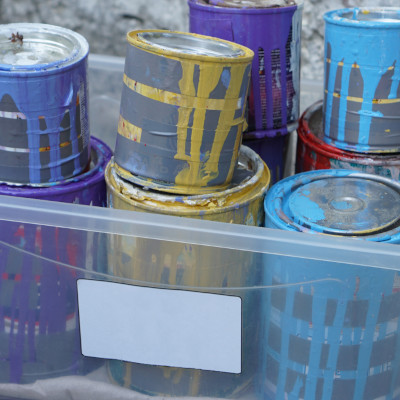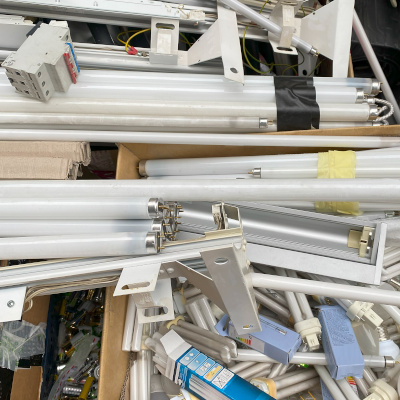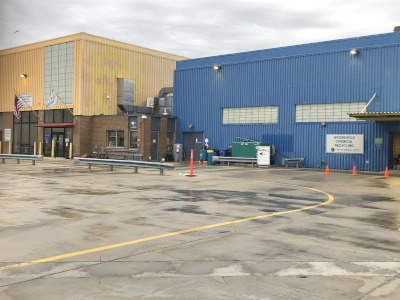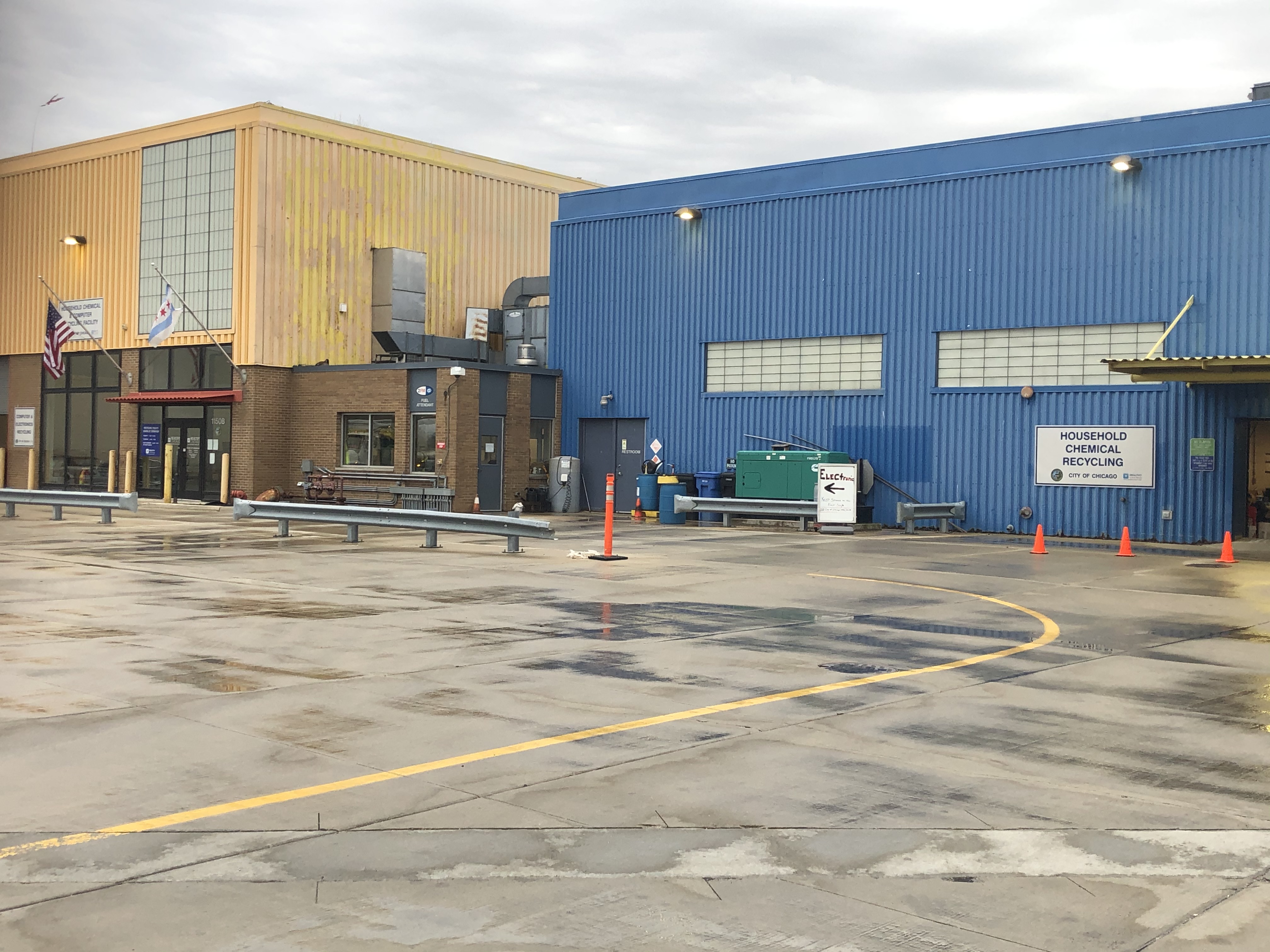Household Chemicals & Computer Recycling Facility
Household chemicals or old computers can be dropped off at the permanent Household Chemicals & Computer Recycling Facility (HCCRF) at 1150 N. North Branch Street (two blocks east of the Kennedy Expressway at Division Street).
When thrown out with our garbage, household chemicals and computers, which often contain hazardous substances such as lead, mercury, and PCBs (polychlorinated biphenyls), can contaminate our air, soil, and water. Through proper disposal methods or recycling, these hazardous substances are disposed of or reprocessed and reused in an environmentally-responsible manner.
The HCCRF accepts a range of items, including household cleaners, oil-based paints, solvents, cell phones, compact fluorescent light bulbs (CFLs), computers and related equipment to name a few. It does NOT accept business/commercial sector wastes, explosives, fireworks or latex paint. Please review the full list of accepted and prohibited items in both the chemicals and electronics categories before you visit.
Looking to dispose of your e-waste closer to home? Recycle your old electronics at one of the City's designated drop-off locations, scheduled April 1-December 30.
What can I expect when I arrive?
Materials should not be left outside the HCCRF unattended and can only be dropped off during scheduled business hours:
- Tuesday, 7 am–12 pm
- Thursday, 2–7 pm
- First Saturday of every month, 8 am–3 pm
There are two drop-off areas at the HCCRF. Upon arrival at the facility, the blue building is designated for household chemicals. The yellow building is designated for old electronics.
When pulling up to the chemical drop-off area during business hours, an attendant will be outside. Please pull up to the edge of the appropriate door following their direction and take your materials out of the vehicle. The attendant will go through all materials to ensure they are accepted and will return any items that are not accepted, at which point you can proceed to the electronic drop-off area or leave the HCCRF.
What materials are accepted?
Accepted:
- Household chemicals (e.g., bleach, harsh cleaning materials, drain cleaners)
- Batteries (e.g., rechargeable, car batteries, small lead acid, lithium batteries)
- Oil-based paints, aerosol paints and paint thinners
- Solvents (e.g., mineral spirits, stains, paint strippers, preservatives, sealers)
- Compact fluorescent light bulbs and tubes
- Antifreeze
- Motor oil, gasoline, auto fluids
- Herbicides, pesticides and insecticides
- Propane tanks for BBQ grills
- Lead acid batteries
- All aerosol cans (e.g., spray paint, hair spray)
- Lawn, pool and hobby chemicals
- Mercury (e.g., thermometers, switches, thermostats)
- Small fire extinguishers
- Small non-refillable cylinders
Not Accepted:
- Business/commercial sector waste (residential waste only)
- Alkaline batteries
- Explosives, ammunition, or fireworks
- Latex paint, acrylic and water-based paint
- Agricultural and institutional waste
- Smoke or carbon monoxide detectors
- Farm machinery oil
- Cement or concrete
- Household appliances (e.g., microwaves, toasters, coffee makers, stoves, refrigerators, washers, dryers, humidifiers, blenders, dehumidifiers)
- Medical waste (e.g., sharps, needles, lancets, biohazards)
- HVAC systems and accessories (e.g., air conditioners, furnaces, filters)
- Radioactive materials
- Refrigerants/freons
- Air conditioners
- Tires
- Large/business copy machines
- Pharmaceuticals
What can I do with my latex paint?

Because of its high disposal cost and low environmental impact, the HCCRF does not accept latex paint. Instead, you can:
- Keep painting: Save leftover paint for a new project or paint scrap lumber or cardboard. Let the empty paint can dry, then throw it away.
- Dry it up: Add kitty litter, shredded paper, or sawdust to absorb the remaining paint in the can, or pour it into a bag. After it dries, throw the bag or absorbent material and paint can away.
- Donate it: Ask friends and neighbors if they need paint for a small project. Local schools or theater groups sometimes look for free paint for sets and art projects.
- Store it: Save the leftover paint for touch-ups in the future. To prevent the paint from drying out, wrap the can’s lid with plastic wrap, making sure the lid fits on securely and doesn’t leak.
What happens to items when they are dropped off?
Materials dropped off at the HCCRF may be recycled, incinerated, reused, or sent to appropriate landfills. Some recycled items include used oil and gasoline, batteries and computers. When items cannot be recycled, they may be sent to special incinerators with state-of-the art air pollution control equipment. If materials cannot be recycled or incinerated, they are sent to special landfills designed to receive hazardous waste. Useable items like household cleaning products and automative fluids may be available for free at the HCCRF material exchange room. Please ask a staff person to enter the room, which is open during regular hours of operation to anyone, not just those dropping off materials.
What can I do with fluorescent light bulbs?
ENERGY STAR™ qualified compact fluorescent light bulbs (CFLs) are a type of light bulb that use up to 75% less electricity, last up to 10 times longer and produce 75% less heat, which reduces home cooling demands, resulting in higher energy savings. While ENERGY STAR™ qualified compact fluorescent light bulbs contain a small amount of mercury, their use creates a net reduction of mercury emissions to our environment, as compared to using incandescent lighting.
It is important to recycle CFLs to help prevent the release of mercury into the environment. Even though the bulbs contain less than 5 milligrams of mercury, a necessary component, the bulbs should be handled responsibly and be recycled. You can take used CFLs to the HCCRF or to your local Home Depot.

What can I do with items not accepted at the HCCRF?
Visit ChicagoRecycles.org to learn more about your waste and recycling pick-up schedule, which outlines what items are accepted for disposal from your residence, and download this waste disposal summary, which includes other disposal resources.
Who can drop off their materials?
All Chicagoans are welcome to drop off their individual household chemicals and electronics at the HCCRF. Businesses and large groups must work with a private disposal company to have these materials properly disposed of.






